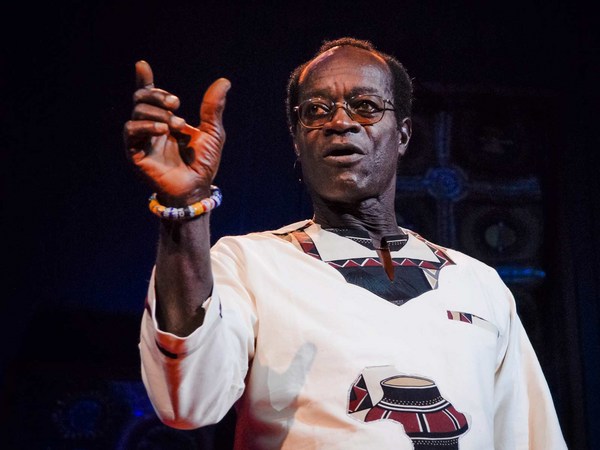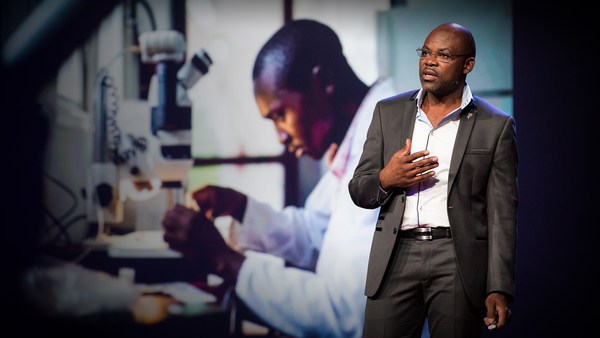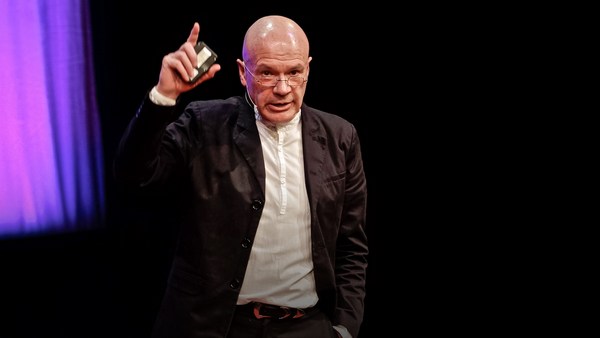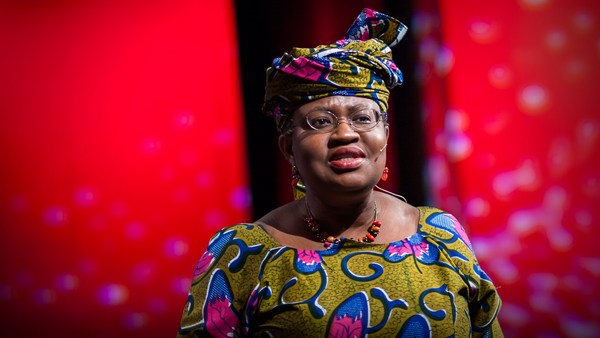In the summer of 2016, I went to Africa for the first time, I was an intern at China House. China House is a social enterprise, integrating China into global, sustainable development through youth engagement. Simply speaking, China House is a social enterprise
that can take you guys to Africa.
(Laughter) Wildlife conservation is one of our focus areas. So as an intern, I was to hold a charity event at Nairobi, the capital city of Kenya, in Eastern Africa. That afternoon, I set up a booth at the China Center. I was standing there, and I saw a Kenya man walking towards me. He was very tall and he looked very serious. He asked, “What are you doing?” “We are doing a charity event for the wildlife conservation,” I explained. He suddenly became very angry. He said, “Don’t you know that you Chinese are the ones who came to Kenya and killed our elephants?, What would you do if we came to China and kill all your pandas?” I was a little bit scared, actually, at that time, because he was tall and he was angry, So I said, “But there are other Chinese people protecting wildlife.” The conversation ended unhappily and he left, I didn’t persuade him. And I was really shocked that local people do have a strong stereotype about us. So I want to find out the truth. Why? In cooperation with TRAFFIC, a leading international NGO fighting against illegal wildlife trade, I traveled to Uganda, another country in Africa. I did a research about Chinese people’s consumption behavior of illegal wildlife products. I went to the local market there, like the pictures showed on the slide. The moment when I entered into the market, there was a local seller (who) came to me and whispered to me in Chinese: “Xiàngyá, Piányí.” (Laughter) “Ivory, cheap.” OK, now I understand, they do have a stereotype. But I’m still confused, Why? Why there are some Chinese people consuming illegal wildlife products? During that month in Uganda, I went to different Chinese companies, Chinese restaurants, every place that Chinese people gather together. I collected over 300 questionnaires I conducted, over 40 in-depth interviews trying to figure out the answer. And there are some interesting answers from the research. Beyond our imagination, some of the consumers, they consume illegal wildlife products not just because they are good, Chinese traditional medicine while they taste well. Actually the reasons behind maybe could be the culture of conformity and the huge communication gap. You may be curious why I can get to know so many different Chinese people in such a country, because I didn’t know any single person before I went there. Because Chinese overseas community is really closely connected inside. That’s also the reason why there are many newcomers to Africa. They got used to the local life very soon, because they joined the network, they follow other people’s lifestyles. I think you may have the similar feelings when you go to Europe, US. It’s the same in Africa, they are closely related inside. I remember I had a Chinese friend in Uganda, he offered me pangolin meat and said, “Zoe, if you do not eat this meat, you have not come to Africa.” I was scared again and I didn’t have it at last. And also the data from the questionnaires shows that many people will consume those products because their families or their friends recommend them to do so. It is because the Chinese communities are like closely related inside. So the huge communication gap between Chinese communities and local communities (is) huge. Many people who consume the products do not even know how serious are the legal penalties, especially for the Chinese construction workers at the construction sites. They are living in the compound, quite isolated from other people. They get all the information they want still from Chinese social media like WeChat. They watch similar network Instead of local TV programs or local newspapers. So even the ban on the consumption of illegal products, have been really common on the local media, but for them, as they do not receive this kind of message very often. I was quite busy in Uganda, I even involved in an illegal, wildlife trade, as I pretended ivory buyer, do I look like ivory buyer? I don’t think so, so I asked my friend from the local NGO, who invited my colleague and I to help him, “Do I look like ivory buyer?, why do you trust me?” He said, “As long as you’re a Chinese, and you speak, and you have like a strong, Chinese-English accent, no problem.” I was still a little bit nervous, so he said, “If you don’t feel confident, you can play the role of the daughter of the ivory buyer.” Maybe that sounds much better. Actually, the NGO, they have been negotiating with the smuggler for a long time, they wanted to catch the smuggler, but the smuggler insisted that he wanted to see the real Chinese buyer before he ships the products to Uganda. So we matched with a smuggler in a cafe and we managed to complete the negotiation, even bargain about the price, like what Chinese people normally do, of course no one payed. And after it was over, my friend from the NGO said, “You did a perfect job.” I felt amazing, but I can’t be proud of it, actually. If China is a problem here, China should be a solution as well. So engaging China, especially Chinese overseas, in global wildlife conservation, has been a goal of mine for the past five years. Together with my colleagues in China House, we traveled to seven African countries to do many wildlife conservation campaigns in Chinese communities. What we are trying to: breakdown the communication gap, so I went inside into the construction sites and had the wildlife conservation workshop with the workers. We were telling them clearly about how serious all the legal penalties are, and how this kind of behaviors, will influence the image of Chinese overseas. And to take advantage of the culture of conformity, we are holding many different kind of pledging events, like the pictures on the right hand, in the Chinese communities. It’s not simply a signature board. We’re encouraging people to sign their names on the board, and commit that they will not consume illegal wildlife products anymore. I saw a lot of discussions happening in front of this board. They were discussing about wildlife conservation, like, “I see my boss name on the board, wee must support him. Let me sign my signature here.” And they were discussing with each other, “If you sign your name on this board, you will never eat wildlife pangolin anymore.” And parents they educating their children in front of the board, “You will never consume this kind of products.” So this kind of conversations they are happening in Chinese communities. People started to talk about wildlife conservation, and there were more people starting to support us. Besides this activities, we also organized many volunteer activities. Like one for rhino horn conservation, work for elephants conservation, and we bring Chinese volunteers to the national parks to try to cut down the snares. The snares on the right hand, the picture, is a kind of snare that local poachers use to put them on the bush and try to catch wildlife, and then they will make them as bushmeat to sell them in the market. Besides, every time I went to new African country, I would try to knock on local media stores and proactively share our stories with them, because I want to gradually change local people’s stereotypes about us. We met many people in the last few years and we influenced many, so our campaigns have reached over 26 million views and reached 160,000 Chinese people directly, and there were 2,545 say no to illegal wildlife trade. But beyond this data, I think what was more important to me was that I saw a lot of small but real changes. I remember there was a time I went to a construction site. It was near the border between Namibia and Angola. It’s a small construction project with less than 10 Chinese workers there. They were building dormitories for local school. I went inside the construction site in the afternoon, and they were demonstrating with body language, tried to communicate with the local staff, they did not speak English. After the dinner, we had the workshop with them. I thought the content may be a little bit boring and far away from them because they looked very, very tired. But out of my expectation, they all signed their names on it. And when we were packing up, I saw, I heard a man talking to his colleague. He said, “Go back, I threw away all the stuff in your bag, otherwise, you may get caught if you go to the airport tomorrow.” So before I did this kind of campaigns in Africa, I thought the consumers were really, really bad people, but when I got to know them, I started to understand that they are just ordinary people. They did it because maybe they don’t know, or because of the cultural conformity. So before condemning the consumers, maybe what we need to do is try to learn the complex issues behind it, and learn how to influence them. So in the past several years in China House, we brought many Chinese young people to learn wildlife conservation globally. We went to Kenya to learn about the rhino horn conservation, to see the last two Northern, wild rhinos in the world. We went to South East of South Africa to learn the different models of lion conservation. Went to Peru and Ecuador to learn the ecosystem of Amazon rainforest. We went to Kalamata Island to investigate about the deforestation and the palm oil planting. I think I’m not a wildlife conservation professional, I have to admit, so I think what I can do is what you could do as well. The first: To learn. The second: Try to start from small and influence the people around you. Maybe you find some of your friends, they have ivory products in their home. The third: If you find that you are really interested in wildlife conservation, maybe it could become your profession too, so welcome to China House! Thank you very much. (Applause)





